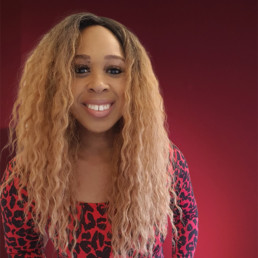
Written by Pamela Aculey
Pamela Aculey is an award-winning author, public speaker, and the founder of Just Like Me Books and MIXD Reality—the creators of the world’s first inclusive augmented reality picture book. Inspired by her autistic son Walter, Pamela is passionate about using storytelling and technology to create inclusive, interactive experiences that reflect the beautifully diverse ways children see and engage with the world. She is also a full-time carer and advocate for representation in education and beyond.
They say necessity is the mother of invention. But for me, motherhood itself sparked an invention that would not only change how my son reads, but how countless children see themselves in stories.
My journey with autism, storytelling, and technology began with my eldest son, Walter. A bright, beautiful mixed race boy who, in his early years, struggled to communicate verbally. Walter is autistic and was non-speaking until the age of 7. As a parent, nothing prepares you for the silence—especially when all you want is to hear your child say “Mummy.” But in that silence, I learned to listen differently. I began to see the world through Walter’s eyes: colourful, musical, expressive in ways that didn’t require words.
Books became a lifeline. But while reading to Walter, I noticed something glaringly absent—him. None of the characters looked like him. None moved, spoke, or communicated like him. Representation wasn’t just lacking; it was almost non-existent. I wasn’t just searching for stories; I was searching for mirrors.
And one day, in the silence, Walter showed me what connection could look like.
He had one particular book he returned to every single day. He’d scan the pages, then walk over and hand it to me—always open to the same page. He’d hum and flap the book gently in front of my face. I assumed he wanted me to read the story—again—for what felt like the tenth time that day. So, I would.
But then Walter would get upset. Irritated.
He’d snatch the book out of my hands and throw it to the floor.
And a few minutes later? He’d bring it back and start the whole process again.
I was confused. Frustrated. Heartbroken.
Until one day, I paused long enough to really look at the page he kept coming back to.
It was an image of a little boy drinking water.
Suddenly it hit me:
Walter wasn’t asking for a story.
He was trying to tell me he was thirsty.
That moment changed everything. My little boy, who didn’t use words, had found his own way to communicate. He didn’t need language—he needed connection.
That’s when the idea behind Just Like Me Books was born. I wanted to create stories that reflected children like Walter—not only in how they look, but in how they experience the world. Our debut title, Buster Finds His Beat, follows Buster, an autistic, music-loving mixed-heritage boy who communicates using beats, rhythm and music. Sound familiar? It should. Buster is inspired by Walter.
To bring the story to life in a way that resonated with children like him, I incorporated augmented reality (AR). I created an app where children can scan the pages and watch Buster dance, laugh, and play drums in 3D. For neurodivergent readers, this fusion of storytelling and sensory experience offers not only joy but accessibility.
Seeing themselves in stories is one thing. Interacting with them? That’s a whole new world.
This innovation became the foundation for MIXD Reality—a creative tech company I co-founded to explore how immersive technology can transform learning, reading, and communication. We now partner with educators, publishers, and brands to create AR-powered experiences across industries: from children’s books and emotional literacy tools to museums, healthcare, and financial literacy.
With nearly 1 in 7 people identifying as neurodivergent (NHS England), we need more than just good intentions—we need practical, inclusive resources. Traditional classroom tools often leave behind children who process the world differently. AR bridges this gap by turning passive reading into an interactive journey that supports diverse learning styles.
We are currently in the early stages of conducting our own research to explore how augmented reality can support autistic children aged 5–8. We are actively seeking partnerships with families and organisations to help us carry out this important work. If you would like to be part of this, please get in touch. Because innovation shouldn’t be reserved for the few—it should uplift the many.
I’ve watched Walter go from being non-speaking to now writing his own short stories—and talking all the time! He’s 11 now, and still beats on everything—tables, tubs, anything that makes a sound. But more importantly, he reads. Not because he has to, but because he wants to. And when he saw himself in Buster, he beamed.
That smile reminded me why I started this work in the first place.
We often talk about diversity and inclusion in terms of policy, but what about practice? Are our bookshelves inclusive? Are we designing content with all learning styles in mind? Are we creating mirrors and bridges?
My hope is that Just Like Me Books and MIXD Reality spark more questions, more conversations, and more creativity.
Because every child deserves to be the hero of their own story—and sometimes, all it takes is pausing long enough to really look at the page they’re holding.

